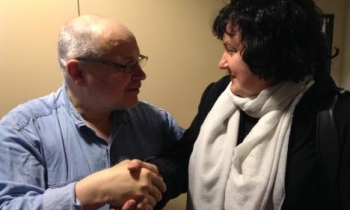Which website best symbolizes the state of online journalism today? Is it CNN.com, the cyber offshoot of the cable news powerhouse? Or is it Wonkette.com, the dishy, irreverent blog about Washington politics edited by Ana Marie Cox?
According to a report released yesterday by the Washington-based Project for Excellence in Journalism, the answer isn't clear. While mainstream media companies capture most of the eyeballs that go online for news, the report suggests that a lack of resources and creativity on their part may open up cyberspace to some unorthodox players who are not bound by traditional journalistic standards.
''Look into cyberspace and the picture for journalism seems fractured," declares the report, titled State of the News Media 2005. ''If the innovative edge for online media is to come from great media institutions with their resources and experience, the signs are so far disappointing. . . . Maybe the innovation will be left to citizens, entrepreneurs, and bloggers who see themselves -- perhaps mistakenly -- as working in opposition to mainstream journalism."
Tom Regan, executive director of the Online News Association, which has 450 members, said it's too early to say how the balance of power between big media and independent voices will play out online. ''I still think the terms are being worked out," he says.
In media circles, 2004 may be remembered as the year of the blog, which the report defines as ''citizen-based, personal-journal postings." The blogosphere is largely united in its distaste for the mainstream media, and bloggers have taken credit for unearthing several scandals before traditional news outlets -- including problems with CBS's ''60 Minutes Wednesday" story on George Bush's military service and the strange resume of James Guckert, the obscure reporter who asked softball questions at White House press gathering.
''There's almost a culture war over what are the values the blogs imply" said Tom Rosenstiel, director of the Project for Excellence in Journalism. While bloggers largely view the mainstream press as an old line ''oligarchy," he said, traditional journalists are concerned about cyberspace turning into ''information chaos."
The State of the News Media 2005 report cites significant growth in the blog culture, pointing to a Pew Internet & American Life Project survey indicating that 27 percent of Internet users are blog readers -- a jump of 58 percent in one year. Still, the report also concludes that ''there is only limited evidence about how they might become commercially viable."
The report did find some positive economic signs in cyberspace for the mainstream media, citing one analysis that the online revenue of nine publicly traded newspaper companies jumped 34 percent from 2002 to 2003. But it also said these outlets were not exactly pouring money into online journalism. ''Despite growing profits and audience, most new organizations were limiting resources in 2004," it said. ''They seemed to be taking a pay-as-you-go approach to the Web."
A 2004 survey by the Pew Research Center and the Project for Excellence in Journalism included in the report found that 62 percent of online journalists said their newsroom staffs had decreased compared to levels three years earlier. Only 37 percent of the national print, TV, and radio journalists polled said the same thing. (The survey also reported that 35 percent of online journalists said they were pressured to do a story relating to an advertiser, owner, or sponsor, compared to only 15 percent of the national journalists.)
In an essay included in the State of the Media 2005 report, Merrill Brown, founding editor in chief of MSNBC.com, pointed out that declining newspaper circulation and diminishing television viewership have strained the resources of the news organizations that are capable of producing large-scale online journalism.
''The current conundrum is that online news, though prospering in some measures, [is] dependent on organizations whose core economics are moving in the other direction," Brown told the Globe.









